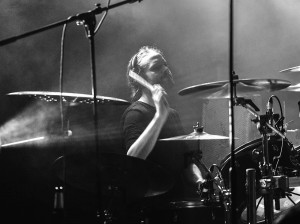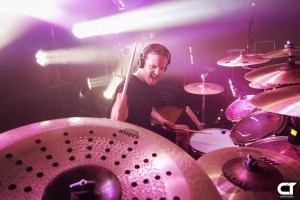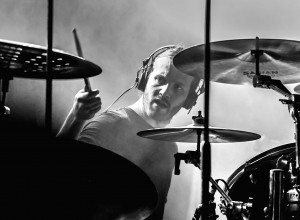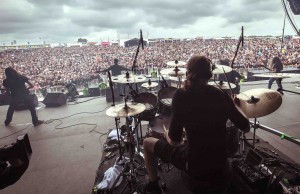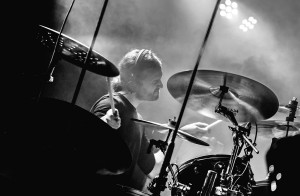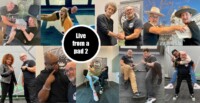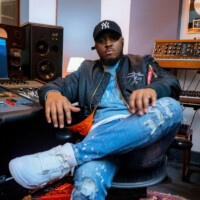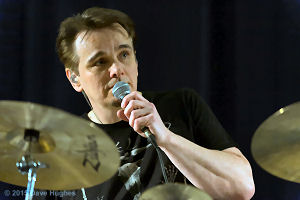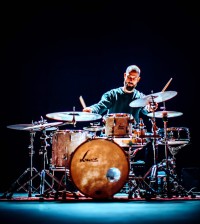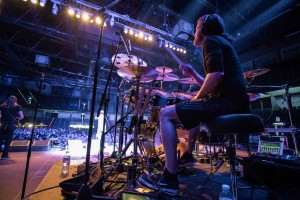 Prog drumming has always been in a different league. Combining the finesse of odd time signatures and intricate rhythms with the raw hard hitting of metal drumming certainly requires a special kind of skill.
Prog drumming has always been in a different league. Combining the finesse of odd time signatures and intricate rhythms with the raw hard hitting of metal drumming certainly requires a special kind of skill.
One UK drummer who’s got this down is Jay Postones.
Spending his childhood in various bands and orchestras, Jay quickly discovered a love for the more complex side of drumming and thus prog music.
For the last ten years he has been the power-house behind UK prog rock band Tesseract who he is not only touring with extensively, but also currently working on the fourth studio album.
Besides the band, Postones runs a boutique snare drum company named Planet Earth Drums who will soon be releasing their first instruments.
You started out on keyboards. Why the change to drums?
Yes, my parents got me a little keyboard for Christmas when I was three and music just came very naturally to me. I played keys in bands all through school until a good friend of mine said to me at a rehearsal “We don’t need a keys player, we need a drummer”. We were only 11 or 12 and didn’t have the knowledge or technology to amplify a keyboard anyway so I went: Well, you can’t hear me anyway. What’s the loudest instrument? Ah, the drums!
There was an old Premier gold sparkle kit in our school music room so I jumped behind that and we ripped into a couple of Nirvana tunes. To my surprise, I could just play. I guess I had some rhythmical ability from playing keyboards – I was familiar with the concept of keeping time and basic rhythms. From then I was like: That’s it, I’m a drummer.
Throughout school, music and art were the only subjects I really had an interest in. They weren’t a chore – they were interesting. I went through a couple of the musical grades, up to grade 6 but I found the theory of music quite boring. For the exams, I’d just learn the pieces that I had to do by heart, but pretend to be reading them. I played drums in different bands throughout school and then after school joined as many bands as I could and some orchestras just so that I could play as often as possible.
Where did it go from there?
Apart from the normal school bands, I also played drums in a jazz and a wind orchestra. Those were a very different outlet for me. It was a reason to play drums, but it wasn’t necessarily the music I wanted to play. It got me out of the house a little bit and the concerts were a great experience because they were much bigger, playing in town halls rather than a classroom. I also performed my first show outside the UK with one of those orchestras too at a safari park in Paris – a very bizarre gig.
When I finished school I was in a couple of bands who were trying to take it seriously but without any real direction. That’s when I started getting into the more complex side of drumming. I was listening to bands like Tool and Meshuggah for example. This was my first experience of odd time signatures and rhythms, and I had no idea what was going on but I knew I wanted to play those kind of drums. So I started to find musicians who could play more interesting ideas, but it was very difficult. I’d limited my horizon to my group of friends and their friends, and the town I was living in – which I soon learned wouldn’t cut it. I had to broaden my geographical horizon to find the right musicians.
Eventually I moved down to Reading, Berkshire where I knew two very capable guitarists. They had started a band already so we joined forces, combining our material. I had a small studio in the Midlands at the time, which I dismantled and moved down to Reading with me. This was my first serious step towards a musical career.
So the interest in prog mainly came out of curiosity about the technical side of things?
I’ve played in orchestras, a blues band, and a covers band, and while they were valuable experiences, it made me quickly realise the kind of drummer that I wanted to be. I’m a bit of a one-trick-pony in that respect, I know where I’m comfortable. If someone was to ask me to play on some reggae track, I wouldn’t be interested – mainly because I wouldn’t know where to begin. Prog has been my thing and I’ve had this stubborn approach throughout my musical life. My Dad was the one who got me started on slightly more complex music – he brought me up on a diet of Steely Dan, Pink Floyd and stuff like that. It’s music that you can listen to and appreciate as background music but if you’re getting into it and actually listen to the detail and the production, there is so much going on.
Where there any specific drummers or bands that influenced you?
I’m not one of those guys who can reel off a list of amazing drummers, but there’s definitely a few guys who I’ve borrowed ideas from. Meshuggah being one of them. Tomas Haake, their drummer, is a machine. I took inspiration from some of the techniques and the ideas that he employs. Specifically trying to keep the hi-hats going with my left foot as a metronome when I play. I see a lot of drummers now playing the most ridiculous things but trying to keep that hi-hat going for me is essential. It’s like a mental metronome. If I keep it going I’m almost dancing. Keeping it going throughout fills is a bit of a challenge but really aids the groove. If I’m playing odd numbers, 5’s, 7’s or 9’s, but I’ve got that pulse going, there’s something for the audience to actually relate to. Most people don’t count that – they just expect a pulse. It might be interesting to a drummer but ultimately if you can’t nod your head to it, you’re just writing music that nobody is gonna listen or dance to.
Other drummers I’ve taken inspiration from: Morgan Agren, Stef Broks, Steve Gadd, and most recently, my peers. Touring with such awesome bands is very inspiring.
Prog drumming is very technical, where did you draw that from? Was that self-taught or did the lessons at school prepare you through maybe rudiments?
Unfortunately I glazed over the rudimentary stuff. For me, it was part of a musical exam at school – and that kind of sucked the fun out of it for me. LRLLRLRR – do that and you get grade 6. I immaturely didn’t see it as a way to expand my drumming vocabulary, but simply a dull exercise I had to learn to pass a test. How wrong I was.
Literally everything a drummer plays is a combination of rudiments. I obviously realise now that the more I practice these basic things, the easier it is to do everything else. People say muscle memory isn’t a thing but I think you build up an arsenal of techniques in your brain and the more of those techniques you practice, the bigger the pool will be for you to pull things out of. Let’s say you have to pull out a crazy fill and you only have two or three rudiments in your arsenal, it’s gonna be a pretty basic fill.
So yeah, a lot of my stuff is self-taught but I did have some lessons at the beginning, which helped me with the basics. I just wish I’d been a little more mature with my approach – but to be fair I was 14.
Let’s chat about Tesseract. How did it come about?
Acle (the guitarist) started writing Tesseract material in 2003 and put it on a few music forums like the Meshuggah forum, sevenstring.org and stuff like that. The guitarist of the band I’d joined in Reading picked up on the Tesseract stuff and sent me a link asking what I thought of the drummer. I just thought it was amazing! I wanted to play drums like that! I listened to it alongside a lot of other material I was into at the time – Dillinger Escape Plan, Sikth, Tool – and even though the Tess’ material was just a demo, to me it was as good or better than some of the pro stuff I was listening to. I knew this guy has so much potential, so why am I not asking him if he’s got a drummer?
I didn’t actually realise at the time that the drums on the demos were all programmed. It sounded so real. This was my first experience of drum programming being indistinguishable from being a real drummer. There was so much detail, dynamics, subtlety, ghost notes and fills that a drummer would do. At the time, Acle was in a band called FellSilent, so Tesseract wasn’t really a thing then – it was more a pool of ideas he was building on the side.
We started talking online and I told him to let me know if he ever needed a drummer. Probably six months after introducing myself online, I was playing a show randomly supporting FellSilent in this weird working-mens club in Luton. At the end of the set I turned around and Acle was behind me on stage. He looked at me and said “Hmmm, let’s sort out a jam.” Finally!
He sent me a CD containing everything he had written for Tesseract. It was about 10 hours of music. I loaded that up on my iPod and listened to it for about nine months straight because I thought at some point there’s an audition coming up. I even bought myself an electronic drum kit so I could practice it all in my flat. So about nine months after we first met we finally had a jam and that was it.
I felt like I had gone on a massively informative and eye opening learning experience just by listening to that stuff for such a long time. It was all material I wish I had the brain-power to come up with, and it taught me a lot.
After our jam, we arranged another one a few weeks later, then pretty quickly found the other members (Amos, James and Abi) and we had a band. There have been various singers over the years but the core of the band has stayed the same.
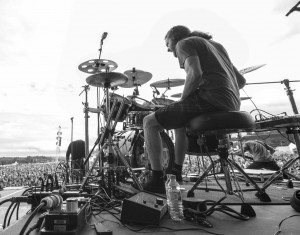 So how long has it been going?
So how long has it been going?
We started playing shows in 2007, so ten years now. The first CD that we didn’t just burn ourselves was an EP called ‘Concealing Fate’ that we released in late 2010. Flipping hell, time flies.
As you’ve just mentioned the band went through a lot of singers and got away from the screaming side of Prog. Did your drumming approach change to accommodate for that too?
To be honest the vocals are generally done after the music is written. Occasionally Dan will come up with a vocal melody and we’ll write to it but typically with Tess’ the music is done first. The older material is definitely heavier, especially some of the unreleased demos and they suited more aggressive vocals. The first album had a few of those moments too. Some of the new material has some backing screaming in there too, so we still have that in us but in the last two albums we kind of found a lighter, maybe more accessible side to the band. Not because we thought people don’t like the screaming but in our early to mid 30s now, we don’t really want to do that anymore. At times screaming has its place but I’m not a fan when it’s the only thing being used – it’s quite one-dimensional to me. Whether it changes my drumming: it doesn’t really other than I’m usually playing something a lot heavier when the vocals are harsh.
You’re recording the new album at your own studios. Do you still have a producer involved or are you doing everything yourselves?
We self-produce everything but we’ve worked with an engineer on a couple of live recordings. Acle has an amazing set-up, he invests a lot of money in gear. When he finds himself with a chunk of disposable income, he generally invests it in a new bit of gear that looks like it shouldn’t cost that much money, but it makes the signal slightly nicer. Years of accumulating that stuff, equals us being able to do it ourselves.
Going into a lush studio is not only a great experience but it also makes you look like you’re a bigger band – but there is also massive price tag. Every time we’ve been to a studio we’ve never paid full whack because we’ve known someone or we had a friend who owns the place, but even then we’re still looking at a four-figure day, and unfortunately we’re not always able to afford that.
So yes, we’re going to self-produce the next record because we have the space, time and the equipment.
Nothing is in stone yet but will probably be early next year. We were aiming for the end of this year but the Megadeth / Mesuggah tour came up which is right in the middle of our writing period. So we pushed it a little bit back to give ourselves some more time.
You also started your own drum company Planet Earth Drums?
Yes, we’re making stave snare drums at the moment. About three years ago I wanted a little project, something to focus my mind. I have some studios down in Reading where I have an enormous amount of spare space to have a workshop, so I thought wouldn’t it be nice to be able to make my own drums and understand a bit more about not just the process of making them, but learn about the reason for choosing certain woods.
Every musician is guilty of this and the people who sell them too – when someone says: “What wood do you use?” “Oh, I use Rosewood, it’s such a warm wood.” Is it? Do you know that? I thought, if I’m in control of my sound – and I want to have the best sound possible for everything I do – I want to understand the reason for choosing a certain species of wood, the difference the bearing edge makes and the difference the hardware makes. I want to confidently a) talk about it and b) go into a recording situation knowing that I’ve chosen the right set up.
It started out as that but also I kind of like making things with my hands. The idea of turning a piece of wood into a drum is hugely appealing to me. It’s been an intermittent process because I tend focus on it when I have some time in between tours and writing new material.
Myself and my good friend Gareth share the responsibility and we’re now getting to a stage where we can confidently make the shells. We’re experimenting with bearing edges and fine-tuning our production methods. While I’m fairly anxious to get something out into the hands of people, I also don’t want to put a product out that I’m not absolutely positive about. So we’re just trying to get it to the stage where we’re completely and utterly happy with it before we launch it.
We’re now developing our own hardware too and setting up a spray booth so that we can apply spray-lacquer finishes, matt finishes etc. This will take us up to the end of the year and then hopefully next year we’ll have something finished to show people.
Sounds like a great project to have on the side.
Yeah, and it’s massively therapeutic as well. If we have time to go in the workshop a couple of days a week, turning a bit of wood into something round and being able to play it a couple of weeks later, that’s awesome.
Any plans to make full drum kits?
Yes, that’s the end goal.
Finally, what’s next?
Well I’m currently on tour in North America with Megadeth and Meshuggah. It’s quite a short tour, only three of weeks. We have a few headline shows booked in as well to make the most of our time here.
We’ve got a handful of Festivals around Europe too. Apart from that we’re just doing lots of writing. We’re trying to hold off on touring a little bit this year because of the album writing. You can’t really do both things well. So yeah, writing and drum making is what’s next.
Also I have a side project called Heights. It’s an instrumental prog three-piece. We’re currently working on our fourth album and it’s going really well. We won a prog award a couple of years ago which, after having worked in the industry for a while, was very refreshing to receive as there really is no business agenda behind the band. Purely music.
And of course performing at the UK Drum Show in September in Manchester. That’s gonna be crazy. It’s an honour to be asked to do something like that and it’s also a little mental challenge. I’ve done clinics and lessons before but something like this is a next level for me, so there is a lot more preparation work to focus on. I’m looking forward to that. It’s gonna be a great chance to meet people, talk a lot of drums and show some fun stuff.
Thanks a lot for your time Jay!
Interview by Tobias Miorin
July 2017

